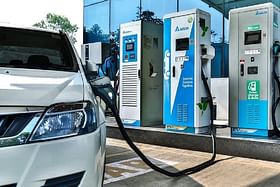Despite the Union Territory administration’s strong efforts, the adoption of electric vehicles (EVs) in Chandigarh remains low.
Over the past five years, EVs have accounted for less than 1 per cent of all vehicle sales in the city. This information was shared by Union Minister of State for Heavy Industries Krishan Pal Gurjar in the Lok Sabha.
In response to questions about promoting EVs, Gurjar revealed that out of a total of 843,049 registered vehicles in Chandigarh since 2018, only 7,628 were EVs as of 21 July 2023. This represents a mere 0.90 per cent of the total, reports Hindustan Times.
Among Union Territories, Delhi has the highest EV penetration rate at 2.71 per cent, followed by Chandigarh. The national average for EV penetration is 0.81 per cent.
Chandigarh’s EV Policy
The UT administration implemented its EV Policy in September 2022 with the goal of transforming Chandigarh into a “model EV city” within five years.
The objective is to achieve a high adoption rate of zero-emission vehicles and reduce pollution.
As part of this initiative, the administration plans to gradually phase out the registration of fuel-run vehicles. This approach aims to discourage people from purchasing vehicles that contribute to pollution and promote the use of electric vehicles.
To reduce the usage of fuel-powered two-wheelers and three-wheelers, the administration had decided to register 35 per cent of electric two-wheelers in 2022-23, 70 per cent in 2023-24, and 100 per cent from 2024-25 onwards.
However, facing criticism for its strict limitations on non-electric vehicle registrations, the Chandigarh administration had to alter its EV policy.
They have now relaxed the 70:30 target of electric and conventional two-wheelers to a ratio of 35:65 — allowing for the registration of 65 per cent non-electric two-wheelers in the current year.
The administration in June, released data indicating that 4,032 ICE two-wheelers have been registered since this financial year.
In contrast to the large number of internal combustion engine (ICE) two-wheelers registered, only 257 electric two-wheelers have been registered in the city since April.
Infrastructure To Support EV Ecosystem
One major challenge in Chandigarh is the lack of public infrastructure to support electric vehicles.
Improving the public infrastructure for electric vehicles is crucial for the successful implementation of the EV policy in Chandigarh.
Currently, there are only eight charging stations with 48 charging points available in the city, as per HT report.
These stations were established in 2018 under the Centre’s faster adoption and manufacturing of hybrid and electric vehicles (FAME) scheme.
The administration needs to invest in expanding the number of charging stations and charging points to meet the growing demand for electric vehicles in the city.
As part of the EV policy, UT aims to have 100 public charging stations by 2024.
In line with this, all petrol stations will be required to install EV charging stations. If space is limited, owners will need to make arrangements to install charging stations in nearby parking areas.
Ranjiv Dahuja, president of the Federation of Chandigarh Region Automobile Dealers, suggests that in addition to promoting EVs, the administration should focus on raising public awareness about effectively using charging stations.


